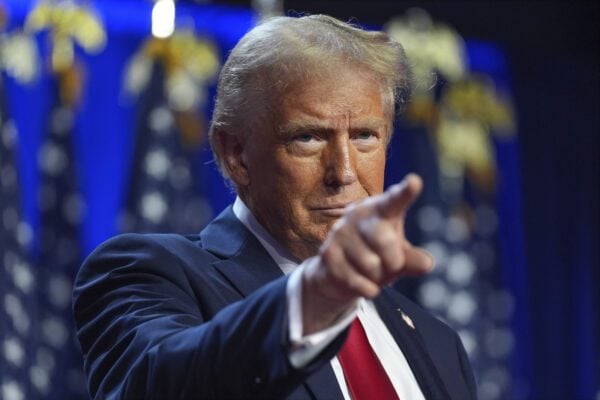

The American people have spoken.
Pulling a Grover Cleveland, Donald Trump was re-elected president of the United States. This election is not just a result; it is a revelation. It is a mirror reflecting America’s divided soul. Irrespective of the outcome, literally half the country was going to be in despair. This is democracy at work.
In part, this election was about nostalgia, including a longing for a past that never was. This nostalgic veneer is not unique to America; it is a common reality of nations worldwide, where the allure of “simpler and better times” often obscures the complexities and progress of the present.
Beneath this yearning lies the fact that demographic and power shifts have redefined what it means to be American. The rueful acknowledgment by some white voters of their diminished influence is not just a footnote; it is a chapter in itself — one that is being written in real time.
Then there is the broader character and ethos of the Republican Party, which has transformed itself into one that channels the attitude, the anger, and the angst of the proletariat of all races and ethnicities. Marx would be proud.
Given this change in the GOP’s approach, an analogy comes to mind. Two of my early career friends, both of whom were engineers, debated the merits of marketing versus engineering (i.e., which was more important). While engineering focuses on structure — the “nuts and bolts” of policies and governance — marketing (political campaigns in this context) is about perception.
Marketing in politics is about how policies are presented and perceived, how they resonate with the emotional and cultural narratives of the electorate. In this election, America leaned more towards marketing, drawn to pre-packaged nostalgia and the promise of regained control, however illusory or fleeting they may be.
As Trump prepares to re-take office, intensely large and practical questions loom: Will the promises of sweeping policy changes — mass deportations, larger tariffs, a redirection of foreign aid into the hands of low-income Americans — become reality?
Other issues are strictly political.
For example, consider the matter of candidate fitness. The GOP has forfeited its right to express moral outrage regarding any Democrat (or member of any other party) running for political office. In embracing Trump, the party crossed a Rubicon of sorts. The concept of a political “bottom” seems to have dissolved, leaving behind a landscape where “fitness for office” has lost its potency.
Of course, this is not just about presidential politics; it extends to every level of governance. Democrats simply will not care about what Republicans think about their candidates for any office, as long as said candidates reflect their interests and aspirations.
It is likely that Republicans don’t fully realize that fact at this point. That party’s tolerance of candidates with deeply flawed legal or ethical records signals a new era, one that is truly Machiavellian.
On this note, there are also highly practical questions. We have just elected a convicted felon. If the state charges against Trump stand, will we have a constitutional crisis? If so, would the Supreme Court act in a partisan way — as it appears to be increasingly likely to do?
These are pivotal matters. Yet, they are secondary to the deeper, more visceral issues that this election spoke to. Trump’s triumph is both an embrace and a repudiation of where this nation has been. It also has every appearance of being a harbinger of things to come.
This leads to consequential questions, some of which even border on the existential. Most prominent among them is this one: Will the very nature of our democracy change? In short, will America under Trump become increasingly authoritarian? For example, will he go after his enemies with the full force of the Executive Branch at his disposal, as if he were the dictator of an island nation?
I hasten to add that the Democratic Party must also look inwards. Long-standing champions of racial justice and women’s rights, the party must reconcile such foundational principles with the broader, more pragmatic concerns of a significant segment of the electorate. Its leaders need to understand that issues of racial justice and women’s rights just aren’t important enough to most Americans. In the well-worn phrase of political legend James Carville: “It’s (still) the economy, stupid.”
Further, I’ve repeatedly warned that the Democratic is shedding Black voters, especially men. The erosion of support among the Democratic Party’s most reliable voters is not just a trend; it is a signal — a clarion call for a recalibration of strategies and messages. Even more importantly in the long run, Hispanic voters seem to be shifting towards the Republican Party. If that trend continues, it will be the end of the Democratic Party as we know it.
Why did Vice President Harris lose? It is crucial to avoid the tranquilizing drug of all-too-simple, reductionist reasoning. Did race and gender play a role? Undoubtedly, they did. But Trump didn’t win simply because he is a white man — one who repeatedly quoted Adolf Hitler and even entertained white nationalists at his home.
It’s rather simple: People, especially those who are hurting economically, vote for the person whom they believe will help them change their circumstances. For reasons that I still cannot understand, for most Americans that person is Donald Trump.
As we look to the future, the tasks ahead are as monumental as they are critical. The nation must navigate through the choppy waters of policy enactments and their repercussions, including the global relationships that will be dictated by the re-elected president — from Ukraine to Israel to China. And, of course, there is Russia. The future is uncertain given Trump’s mercurial and unpredictable personality.
Beyond the immediate and the tangible lies the deeper challenge: Healing a fractured nation and building a collective sense of purpose and identity.
“What comes next?” is not just a question of policy but of identity and direction. As we step into this next chapter of America’s story, let us hope that it is written with an eye not just to the past or the present, but to a future where unity and mutual respect can find a place at the table of national discourse.










